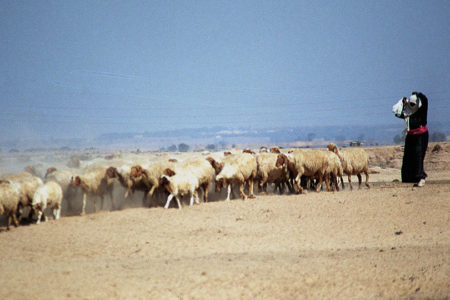A Step in the Wrong Direction
A pastor in the Midwest tells about his early years trying to shepherd a church that his entire family attended—sisters, brothers, and father.
Apparently it wasn’t easy. During a business meeting when he was trying desperately to make a point, his sister jumped up to remind him, in front of everyone, “I changed your diapers.” Not helpful, to say the least.
Finally, either at that meeting or another, the pastor’s father and patriarch of the family had had it. Rising slowly from the foot of the table, he looked at his daughter and declared, “This is not your brother. This is your pastor.”1
It is almost an art to know one’s place. Rabbi Noah Weinberg, dean and founder of the worldwide Jewish teaching organization Aish HaTorah (“the fire of Torah”), says that knowing where you stand in relation to others (Hebrew, hamakir et mikomo) is essential for successful living.
“Before you begin talking,” he says, “stop to think: Is this a time to step forward, or a time to step back?”2
That is good advice. And it is even better advice for people who tend to lose sight of where they fit in relation to others and forget to give respect where respect is due.
Miriam is probably one of the most prominent women in the Hebrew Scriptures. She was Moses’ older sister, a prophetess in her own right (Ex. 15:20), and a leader of the multitude of Jewish women whom her brothers had led out of slavery in Egypt.
In Micah 6:4 the Lord included her among the leadership when he said, “For I brought thee up out of the land of Egypt, and redeemed thee out of the house of servants; and I sent before thee Moses, Aaron, and Miriam.”
But somehow Miriam forgot her place. She began to think more highly of herself than she should have and stepped forward when she should have stepped back.
Because of a petty family squabble, Miriam and Aaron challenged Moses’ authority. The result was a rebuke so humbling and severe that it remains to this day one of the best-known facts about Miriam.
Miriam was well up in years when chastened, the matriarch of what could easily be called the First Family of Israel. At eighty, her youngest brother, Moses, was handpicked by Almighty God to deliver the Israelites from bondage, give them the Law on Mt. Sinai, govern them, and form them into a nation in covenant relationship with Him. Her other younger brother, Aaron, at eighty-three, was second in command to Moses and God’s choice for high priest—the highest spiritual position under the Mosaic Law.
Scripture does not say whether Miriam ever married. She is never referred to as anyone’s wife or mother. Aaron, however, married prominently. His wife, Elisheba, was the sister of Nahshon, “prince” of the tribe of Judah (Ex. 6:23; 1 Chr. 2:10) by divine appointment. When the Lord told Moses and Aaron how to encamp the tribes around the Tabernacle, He named Nahshon, the son of Amminadab, “captain of the children of Judah” and its 74,600 fighting men (Num 2:3–4).
From Miriam’s perspective, Aaron had married well. However, her brother Moses, whose “diapers” she no doubt had changed, was another story.
Moses had married a Cushite woman (12:1). Scholars disagree over whether this woman was Zipporah, the daughter of Jethro, the priest of Midian, or someone Moses married after Zipporah died. Either way, Miriam did not like her:
And Miriam and Aaron spoke against Moses because of the Cushite woman whom he had married….And they said, Hath the LORD indeed spoken only by Moses? Hath he not spoken also by us?” (Num. 12:1–2).
Apparently, Scripture names Miriam first because she was the chief offender. The Hebrew word for “spoke” is feminine and reads in the original text, “And she spake, Miriam and Aaron, against Moses.”3 Perhaps she was jealous and felt Moses’ wife threatened her position. Perhaps she was prejudiced and considered her sister-in-law inferior and unsuitable for such a prominent family. Whatever the reason, Miriam crossed a line. And she brought Aaron, weaker in character than Moses, with her.
So the Lord descended in a pillar of cloud and challenged them:
My servant, Moses, . . . is faithful in all mine house. With him will I speak mouth to mouth, even plainly, and not in dark speeches; and the similitude of the LORD shall he behold. Wherefore, then, were ye not afraid to speak against my servant, Moses? And the anger of the LORD was kindled against them (12:7–9).
When the Lord departed, Aaron looked at Miriam, “and, behold, she was leprous” (v. 10).
God had reminded Miriam who Moses was. He was not merely her brother. He was God’s chosen servant. And her closeness to him gave her no right to denigrate him.
So the Lord vindicated and exalted Moses, whom He called “very meek, above all the men who were upon the face of the earth” (v. 3). And Miriam, who had succumbed to pride, He slapped back in place. Aaron then begged Moses to forgive them, and Moses “cried unto the LORD” to heal her (v. 13).
The Lord did so, but said, “If her father had but spit in her face, should she not be ashamed seven days? Let her be shut out from the camp seven days, and after that let her be received in again” (v. 14).
So Miriam endured public disgrace because she had allowed a family squabble to stoke her pride and provoke her into undermining the authority of God’s servant.
The apostle Paul wrote, “Render, therefore, to all their dues: tribute to whom tribute is due; custom to whom custom; fear to whom fear; honor to whom honor” (Rom. 13:7).
When you know someone well, it is particularly easy to forget your place in relation to others and step forward when you should step back. As this world deteriorates, pride and arrogance run amok. But the Bible teaches the opposite. It teaches humility, honor, and respect, no matter how close the relationship.
Children are to respect their parents; employees, their employers; wives, their husbands; a congregation, the shepherd of the flock, etc. That is God’s way: “forbearing one another in love” (Eph. 4:2); esteeming others better than ourselves; and doing everything without complaint (Phil. 2:3, 14), “that ye may be blameless and harmless, children of God, without rebuke, in the midst of a crooked and perverse nation, among whom ye shine as lights in the world” (Phil. 2:15).
ENDNOTES
- Walter Wright, “Andrew on the Loose,” [www.adventistreview.org/2001-1526/story3.html].
- Rabbi Noah Weinberg, “Way #26: Know Your Place,” [www.aish.com/spirituality/48ways/Way_26_Know_Your_Place.asp].
- Alfred Edersheim, Bible History, Old Testament, Book 2: The Exodus and the Wanderings in the Wilderness (Peabody, MA: Hendrickson Publishers, 1995), 243.







